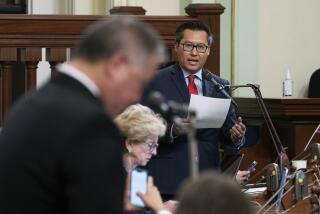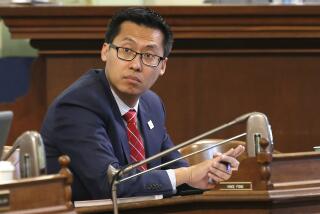Prosecutor Can Use Maiden Name on Ballot
- Share via
A deputy district attorney can use her maiden name on the ballot in her race for Superior Court judge against her former boss, a judge ruled Wednesday.
Superior Court Judge Tully Seymour made it clear early in the 45-minute hearing where his sympathies lay, knocking down the plaintiffs’ arguments as to why the candidate should either be listed by her married name or thrown off the ballot entirely. “I think she always had the maiden name and always had the right to use it,” Seymour said when he made his ruling, allowing the candidate to run as Stephanie George.
More than anything, the case pushed an obscure judicial race into the media three months before the election and provided an unknown candidate with publicity.
The suit was brought by retired Marine Lt. Col. Otto Schmidlen, who was not in court Wednesday, nor at the first hearing Monday.
Stephanie George Deamon and her legal team have charged that her opponent for the judgeship, former Dist. Atty. Mike Capizzi, is behind the suit. They have called the legal action sexist and Capizzi cowardly for not bringing the legal action himself.
“I’m hard-pressed to think it’s not something orchestrated by him,” George Deamon said. “I don’t think Otto Schmidlen cares what my name on the ballot is.”
*
Schmidlen’s attorney, David Robinson, argued that the state election code required George Deamon to use her married name, under which she is registered to vote. He also argued that by using her maiden name, George Deamon was making it more difficult for the public and the press to check out her background.
“You don’t seem to give the press much credit for intelligence or the ability to figure things out,” Seymour responded.
George Deamon and her attorneys said the suit was an attempt to force her to use a name for which she is less well-known in law enforcement and legal circles. Those carry great importance in a judicial race to which not many voters will pay attention.
They argued the law was meant to prevent people from choosing names to confuse the voters. The judge agreed. “If she were using a fictitious name, then you’d have a strong case,” he told Robinson.
Schmidlen, a former grand jury foreman, did not return phone calls Wednesday.
Capizzi said in a telephone interview that this was not his suit. But he said he had spoken with Schmidlen’s lawyers. “His attorneys asked questions, and I certainly responded to those questions, but I don’t think it’s fair to them or the petitioner to get into the details of those conversations.”
Schmidlen and the men listed as his attorneys in the lawsuit, Mark Edwards and Thomas Malcolm, are Capizzi supporters.
Robinson, who appeared in court Wednesday, said he had contributed $1,000 to Capizzi’s judicial race. Robinson said he wasn’t being paid for his legal work, while Schmidlen said Monday that he was paying for the suit.
Robinson said he had not met Schmidlen and didn’t know why he had filed the suit. He said he represented Schmidlen at the hearing because Malcolm had a scheduling conflict.
More to Read
Sign up for Essential California
The most important California stories and recommendations in your inbox every morning.
You may occasionally receive promotional content from the Los Angeles Times.











